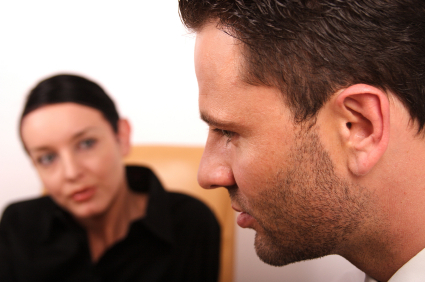Cognitive Behavioral Therapy an Effective Follow-up to ECT
While electroconvulsive therapy (ECT) is very effective treating acute depression, especially among patients who have not responded to antidepressants, relapse rates following ECT are high. Researchers have been exploring treatments that may extend the effectiveness of ECT and reduce relapses, including antidepressant medication and continuation ECT. A new study by Eva-Lotta Brakemeier and colleagues in the journal Biological Psychiatry finds that cognitive-behavioral therapy combined with medication was most effective at sustaining response to ECT.
In the study, 60 patients who responded well to three-times-per-week right unilateral ultra-brief ECT then were prescribed antidepressant medication following current guidelines for ECT followup. Of these patients, one-third were randomly assigned to receive the medications only. Another third were randomly assigned to receive the medications and continuation ECT, and the final third were randomly assigned to receive medication and participate in 15 weeks of cognitive-behavioral therapy in a group setting. Each group was observed at six months, and then at one year. The group who received medication and cognitive behavioral therapy had significantly higher response rates than the other groups at both follow-up evaluations.
After the initial treatment with ECT, 70% of the patients had responded and 47% had achieved remission. Following the six months of continuation treatment, 77% of the group that received medication and cognitive behavioral therapy responded, while only 40% of the group receiving medication and continuation ECT responded, and 44% of those receiving medication alone responded. After one year (six months following the end of treatment), response rates were 65% for those who had received medication and therapy, 28% for those who had received medication and ECT, and 33% for those who had received medication alone.
Editor’s Note: These results are striking for several reasons. As has been found in most studies, continuation ECT is not very effective at sustaining remission. Cognitive behavioral therapy with medication beats the other options hands-down. These results are in accord with others that show that cognitive behavioral therapy also helps prevent relapses in patients who responded well to medications. The take-home message is that people who respond well to antidepressant medication or ECT would do well to add cognitive behavioral therapy to their other preventive treatments.
The current study did not replicate parameters for continuation ECT that were successful in a study by Axel Nordenskjöld and colleagues in the Journal of ECT in 2013. Nordenskjöld used weekly ECT for six weeks and every two weeks thereafter, for a total of 29 ECT treatments in one year, and found this more intense regimen was more effective at preventing relapse than medication alone.
Long-term Course of Bipolar Illness is Most Difficult
While the 4 major childhood-onset psychiatric illnesses we discussed this week (bipolar, unipolar, ADHD, and anxiety disorders) show long term difficulties into adulthood in the majority of instances, it appears that the most severely impacted are those with bipolar disorder. These data are also consistent with retrospective data from multiple cohorts of adults with bipolar disorder, which indicate that those whose illness began in childhood fared more poorly in adulthood than those with adult-onset illness. Thus, while there has been a modicum of treatment research in childhood depression and anxiety disorder and a plethora of treatment studies in ADHD, the dearth of treatment studies in children with bipolar disorder is all the more disconcerting.
Bipolar disorder is common, occurring in some 2 to 3% of children and adolescents, and carries a relatively grave prognosis into adulthood in the majority of instances, especially when it is inadequately treated. Virtually all of the investigators in the area of childhood-onset bipolar who presented at the AACAP meeting have pleaded for increased treatment research for bipolar disorder in children, and one can only hope that their message is soon heard.
Long-term Outcomes for Childhood-Onset Disorders: Bipolar Disorder
This week we’ll be summarizing the research on long-term outcomes for four childhood-onset illnesses: bipolar disorder, unipolar depression, attention-deficit hyperactivity disorder (ADHD), and anxiety disorder. The information comes from a symposium at the 2012 meeting of the American Academy of Child and Adolescent Psychiatry (AACAP).
Course of Childhood Onset Bipolar Disorder
At the AACAP meeting, researcher Boris Birmaher discussed the considerable differences in presentations of bipolar disorder in childhood versus in adolescence. In childhood there appeared to be a more sub-syndromal symptoms or diagnoses of bipolar not otherwise specified (BP-NOS). There were more mixed symptoms, more hallucinations, worse course of illness, more comorbidities with ADHD and oppositional defiant disorder, and more separation anxiety disorder. In contrast, in adolescence there were more diagnoses of bipolar I and bipolar II, major depression, mania with elation and grandiosity, substance abuse, and conduct disorder.
Birmaher reported that while most children with early-onset mania recovered within two years, roughly 80% experienced recurrences over the next two to five years. Over a follow-up period of four years, 30% remained euthymic, 40% had continuing substantial symptoms, and 20% remained seriously ill. Birmaher’s data indicate that those with childhood-onset bipolar illness remained symptomatic during 60% of the follow-up period.
Predictors of a more difficult outcome included an early onset, a BP-NOS presentation, longer duration of illness, any comorbid illness, lower socioeconomic status, and a family history of bipolar disorder in first-degree relatives. Birmaher reported that these data in childhood-onset mania were consistent with earlier research by Judd and colleagues in a longitudinal follow-up study of adult patients with bipolar disorder. However, there were three major differences. The proportion of time well was lower in children (41.1%) than in adults (52.7%). Time in mixed episodes or rapid cycling was higher in childhood-onset bipolar disorder (28.9%) than in adults (5.9%). Rapid changes in polarity were also more common in children (15.7% ) than in adults (3.5%). Read more
Preventing Recurrent Mood Episodes
Psychotherapy and psychoeducational approaches, long-term psychopharmacology, and combination therapy all play a role in preventing recurrent mood episodes.
Psychotherapeutic and Psychoeducational Approaches Are Critical
A number of studies presented at the 4th Biennial Conference of the International Society for Bipolar Disorders in Sao Paulo, Brazil in March indicated that cognitive-behavioral therapy (CBT) and individual and group psychoeducational approaches enhance both short- and long-term outcomes for patients with bipolar illness. These studies add to an already substantial literature that shows that focused psychotherapies (such as cognitive/behavioral, interpersonal, and social rhythms therapies) and psychoeducation are superior to treatment as usual.
These therapies can provide a variety of approaches to stress management and reduction, and can enhance family and interpersonal communication. Another way these focused psychotherapeutic approaches help patients is by demonstrating the benefits of effective long-term preventive treatment and encouraging its consistent use.
Without consistent prophylactic treatment, patients are at high risk for recurrences and their subsequent psychosocial and neurobiological consequences. Greater number of prior episodes is associated with an increased risk of psychosocial dysfunction, treatment resistance, cognitive dysfunction, medical comorbidities, and even dementia in old age.
After the jump: preventive psychopharmacology and combination therapy. Read more





